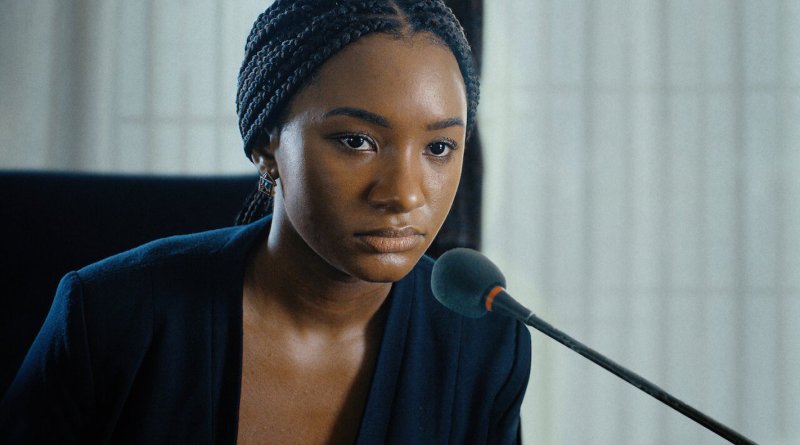Citation is more than just a film about sexual assault. It is a movement. Released on Nov. 6. in the U.S., Citation serves as an example of what sexual assault victims experience all over the globe.
Moremi, who is the main character of the film, is a medical student at a public university in Nigeria. She soon becomes acquainted with her professor Lucien N’Dyare.
N’Dyare asks Moremi to teach him how to drive a stick-shift, and it is with this simple act that their relationship starts to form. However, N’Dyare takes advantage of the supposed professional relationship and eventually attempts to rape Moremi.
Surprisingly, the film isn’t as predictable as one might expect. Her case is exposed to the entire campus. However, the response to her accusations are quite positive considering the scolding that sexual assault victims usually face. A couple of her fellow classmates even offer to hang up flyers to spread the word about what she is fighting for. Everyone believes Moremi’s accusations except for N’Dyare’s friend, Professor Osagye.
Moremi informs her boyfriend Koyejo of N’Dyare’s behavior. Koyejo advises Moremi to stay away from him. However, Moremi chooses to continue to interact with him and not say anything to his higher ups. This causes a strain on Moremi and Koyejo’s relationship. However, Koyejo’s support is still admirable. Instead of finding a reason to blame her, he believes what she says about N’Dyare. This support from her boyfriend and classmates continues throughout her trial.
As the trial unfolds, Moremi becomes more frustrated and doubtful. Her lawyer informs her that despite their evidence against N’Dyare their case could still be dismissed. N’Dyare seems to have a solid argument until Moremi later finds out that he has assaulted several women from other universities prior to his employment at Moremi’s school.
She also meets a man whose relative was once a victim of N’Dyare. As a result of the shame and stigma she faced after being assaulted, the victim took her own life. After sharing his story, the relative agrees to be a witness for the trial, giving Moremi’s case even more support.
The unity in this film is so refreshing and hopeful. Seeing that most of the characters supported Moremi instead of trying to dim her voice is amazing to witness. These are the actions that should be encouraged and practiced when someone is dealing with something as unfortunate as sexual misconduct.
Encourage those who have experienced harassment or assault to speak out when they are ready. Don’t be the reason why they never choose to talk about their experience.
Moremi, who is the main character of the film, is a medical student at a public university in Nigeria. She soon becomes acquainted with her professor Lucien N’Dyare.
N’Dyare asks Moremi to teach him how to drive a stick-shift, and it is with this simple act that their relationship starts to form. However, N’Dyare takes advantage of the supposed professional relationship and eventually attempts to rape Moremi.
Surprisingly, the film isn’t as predictable as one might expect. Her case is exposed to the entire campus. However, the response to her accusations are quite positive considering the scolding that sexual assault victims usually face. A couple of her fellow classmates even offer to hang up flyers to spread the word about what she is fighting for. Everyone believes Moremi’s accusations except for N’Dyare’s friend, Professor Osagye.
Moremi informs her boyfriend Koyejo of N’Dyare’s behavior. Koyejo advises Moremi to stay away from him. However, Moremi chooses to continue to interact with him and not say anything to his higher ups. This causes a strain on Moremi and Koyejo’s relationship. However, Koyejo’s support is still admirable. Instead of finding a reason to blame her, he believes what she says about N’Dyare. This support from her boyfriend and classmates continues throughout her trial.
As the trial unfolds, Moremi becomes more frustrated and doubtful. Her lawyer informs her that despite their evidence against N’Dyare their case could still be dismissed. N’Dyare seems to have a solid argument until Moremi later finds out that he has assaulted several women from other universities prior to his employment at Moremi’s school.
She also meets a man whose relative was once a victim of N’Dyare. As a result of the shame and stigma she faced after being assaulted, the victim took her own life. After sharing his story, the relative agrees to be a witness for the trial, giving Moremi’s case even more support.
The unity in this film is so refreshing and hopeful. Seeing that most of the characters supported Moremi instead of trying to dim her voice is amazing to witness. These are the actions that should be encouraged and practiced when someone is dealing with something as unfortunate as sexual misconduct.
Encourage those who have experienced harassment or assault to speak out when they are ready. Don’t be the reason why they never choose to talk about their experience.
You may also like
-
Lady Gaga’s “Mayhem” Fails to Disappoint
-
Crossroads Live Delivers a Phenomenal Production of Dear Evan Hansen in Columbus
-
UWG Theatre Breathes New Life into a Beloved Classic
-
QSA Annual Drag Show Entertains Eager, Diverse Crowd
-
Lucy Dacus’ Fourth Studio Album, Forever Is A Feeling, Encapsulates The Vulnerability and Thrill of Falling In Love
